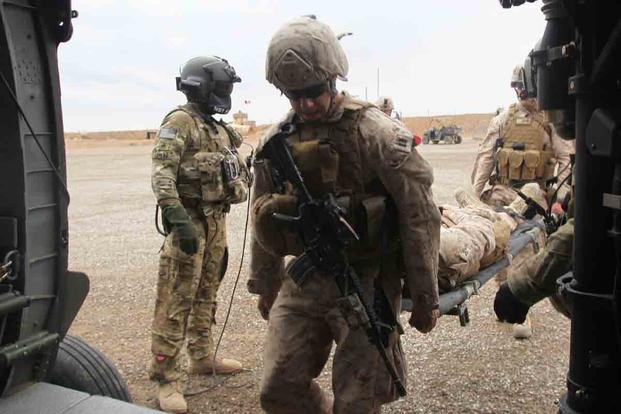With the rise and reemergence of the coronavirus, medical personnel are in high demand and short supply. So it might come as a surprise that veteran Army and Air Force combat medics and Navy corpsmen are being turned away when they try to help.
The reason for this is that many states don't accept military training or credentials in civilian hospitals. There are 28 problem states in all, and only six states really handle the issue well. This comes from Dan Goldenberg, executive director of the Call of Duty Endowment, the largest private funder of veteran employment initiatives.
Goldenberg is a retired naval officer of 27 years who has led the organization since 2013. He says the problem is that there's no federal standard for veterans moving to jobs like civilian emergency medical technicians, or EMTs, and the states each have their own requirements. In some cases, requirements can vary by county.
"They make [veterans] basically either start over or do a whole bunch of extra surplus stuff," Goldenberg told Military.com. "In most cases, especially with army medics, they have a national civilian EMT certification. So the problem is going from that EMT certification to getting licenses in the various states."
It all started early on in the COVID-19 pandemic as the need for medical workers grew. (According to the U.S. Bureau of Labor Statistics, employment in the field is still down by more than 500,000 jobs since February 2020.) Goldenberg wondered how veterans with medical experience were faring. He reached out to Hire Heroes USA, a major partner of the Call of Duty Endowment that collects and parses data on veteran employment.
"We asked them how medics and corpsmen are faring," Goldenberg said. "They looked into it and said, 'Actually not well. Half of former medics and corpsmen who want to work in the health-care industry cannot get jobs in that industry,' which was pretty shocking to us."
The endowment then went out to collect its own data, grading the licensure process in each state and U.S. territory. What they found was that a majority of those places have their own rules for transferring military training, some of which are just bizarre at best and nearly impossible at worst.
"The really difficult ones will ask them to show a license from another state," Goldenberg said. "Well, they never had a license from another state because they didn't need it. Or before the state will count military training, they have to go back and find the original military instructor who gave the initial training and have them sign off that they completed [it]. They won't accept a transcript from the school in San Antonio. In Wyoming, they have to start over completely."
Call of Duty Endowment will publish a paper on its findings at the end of October 2021. The findings not only will include state-by-state barriers to entry for military medical veterans; it also will grade the states on their barriers and correlate the information to the states' individual demand for medical personnel. The idea is to inform state governments, some of which aren't even aware their rules are a hindrance to veteran hiring, and pressure them to make the right changes.
And those changes are something the whole country can feel good about. The Army used these personnel to augment their active-duty medics and corpsmen while those troops went out to build field hospitals and vaccination centers.
"Early on in the pandemic response, the Army put out a call asking for former military medical personnel to volunteer to help in local hospitals," Goldenberg said. "And they got like 20,000 volunteers in a week. So the military was confident in them, but the civilian sector wasn't. It was just nuts."
For the Call of Duty Endowment, an overall problem about veteran employment is that the civilian sector is just not correctly recognizing the skills veterans bring and putting the right premium on them, Goldenberg said. There are 30,000-50,000 veteran medical personnel unemployed or underemployed -- those with less than full-time, regular or adequate employment -- who want to help.
"You were patching together Marines in the Khyber Pass [in Pakistan], vaccinating tribal elders in Afghanistan, prescribing medicine to your troops and taking care of local malnourished children," Goldenberg said. "But all those efforts mean nothing to a lot of the states."
Want to Know More About Veteran Jobs?
Be sure to get the latest news about post-military careers as well as critical info about veteran jobs and all the benefits of service. Subscribe to Military.com and receive customized updates delivered straight to your inbox.












